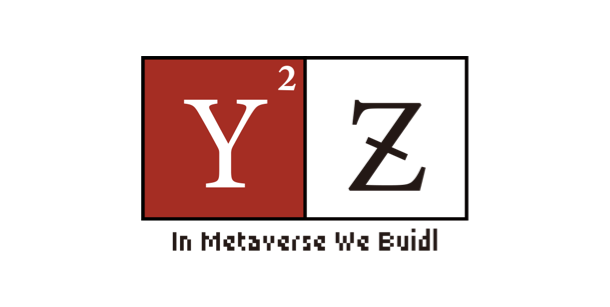A Figurative Painting on Game Guilds: Varieties of ecosystem behind similar projects
Author:Aiko, Web3 & Game Analyst
Plenty of so-called “guilds” have sprung up recently and been considered comparable to YGG, but there are very different management and operation in each of them behind the same sign of “guild”.
This article aims to explain the inter operation of YGG in detail, clarify the differences between guilds, and predict the market niche of future guilds, hoping to bring some thoughts to web 3 developers and investors.
1. The internal organization of YGG
(YGG Treasure+ YGG SubDAO)
1.1 Community management
YGG DAO consists of scholarship players, ambassadors, and community operation members.
Scholarship players are generally composed of ordinary members in the community, but with the development of guild events and game arena, some skilled players will form specialized esports teams, details will be introduced later. The average player will learn gaming and yield farming under the guidance of coaches. Ambassador refers primarily to staff who recruit and train players in various regions. Community manager, on the other hand, focuses on managing communities with rules and regulations, organizing community activities and voting, etc.
The DAO organization is different from the centralized management system, so members are required to make active contributions. Therefore, it has clear incentive measures, which is called the level-up system in YGG, and reward from four responsibilities: class leader, guild events, tournament, and voting participation. Guild events include periodic competition in games and community daily activities; tournament refers to large-scale competition which is separated from routine, and its reward objects include esports players, event organizers, hosts and so on.
Members of the DAO that hold YGG tokens enjoy the governance wight and the revenue brought by the business activities such as staking and leasing of game assets. If a member participates in a sub DAO, he/she shall also need to engage with the DAO construction and get the privilege interests of the sub DAO Token.
1.2 Sub DAO
While cryptocurrencies facilitate the accessibility to worldwide users, guild management has yet to fully transcend geographical boundaries due to language constraints, and that’s why Sub DAO exists.
Sub DAO is subordinate to YGG DAO, which focuses on some regions or a branch of comprehensive game projects. YGGSEA is a SubDAO focusing on the Play to Earn game community in Southeast Asia. In addition to organizing community events like the main DAO, SEA contributes to guild localization, crossing regional and language barriers to add value to main DAO.
Sub DAOs go into the field to recruit players, train players, localize the game, and integrate talent into the DAO organization includes:
· organize activities in specific areas;
· operate and regulate small teams;
· adapt different managements varying regions and change strategies in time;
· recruit and retain native talents (mostly "ambitious and energetic young people");
· manage with rules and regulations;
· try to keep members' income stable;
· incentivize members to contribute for "ownership";
· issue region-specific sub DAO tokens.
Localization also maximizes return on investment by bounding with players and focusing their needs, habits, and revenue, which is better able to transcend regional and cultural constraints.
In order to ensure the player's experience and gather useful user feedback, the SubDAO will also:
A.) Exchange popular game resources and information ranging from different regions;
B.) Collect player information and feedback quickly and quantitatively to bridge players and developers;
C.) Allow players to gain additional revenue, such as holding local esports competitions, providing insurance, loans, etc.
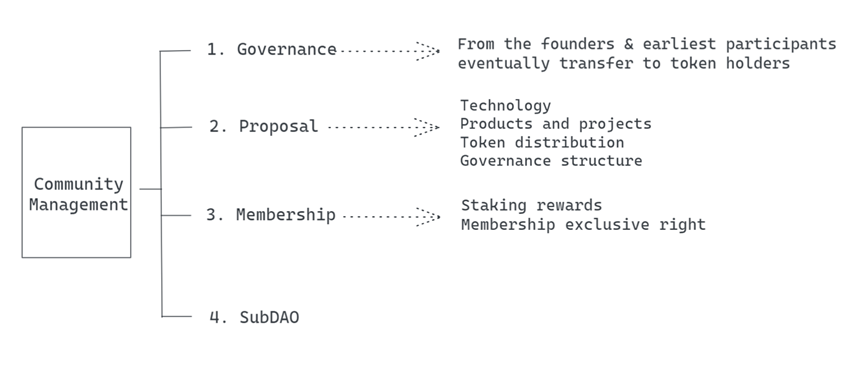

1.3 YGG Treasury
The department responsible for asset management in YGG DAO is called YGG Treasury, which purchases game assets, scheme asset allocation, and publicize the use of assets. The assets of YGG DAO are not only raised in the early stage, but also profits from game assets staking, renting, and other value-added interactions.
There are not only members of Treasury who study each game and teach profitable methods to the average player from arbitrage farms, but also evaluate game projects value in an early stage for seed investment.

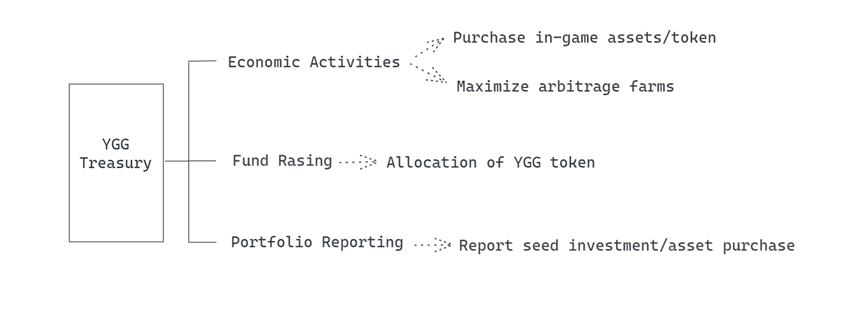
1.4 YGG Token
YGG token, which is the index of all SubDAO tokens, aggregate the token income generated by utilizing the assets of each Sub DAO, the value of all NFT assets and their earnings, and the growing user base. As the NFT gaming economy grows, it will have a multiplier effect on YGG's value with NFT assets leasing, sale, other forms of benefit (incubation or acquisition of airdrops) and esports revenue.
The value of YGGtoken comes from the proceeds of its ownership of all sub DAOs, and the Treasury contains a portion of the assets (NFT and tokens) of each game in sub DAOs, while the rest is earned by the community and invested into the game. YGG Token reflects the ownership proportion of each tokenized SubDAOs as:
A = % Axie SubDAO (YGGAXS) + % Lok SubDAO (YGGLOK) + ……+ % Zed SubDAO (YGGZED)
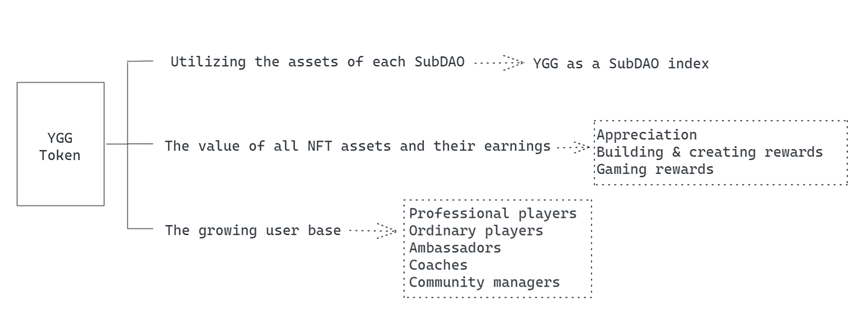
2. Traditional guilds vs. crypto guilds
2.1 The relationship among players, guilds, and developers.
Gold farming in traditional games is a universal demand of players, but it is attacked by the law, game developers, and players.
Legally speaking, the regulation on virtual assets is incomplete. Gold farmers conducts massive transactions but are not constrained to the tax system. The automated robots over-product game assets that destroy the game economy system also infringes the interests and intellectual property rights of game developers.
For game developers, although there are some manufacturers of mobile game cooperate with guilds to promote their projects and increase the active user amounts, it is more common in game industry that the development team block some plugin users and ban gold farmers’ accounts, because gold farming behavior impact the overall balance of the gameplay even may directly damage the ecosystem.
In Diablo 3, the gold in the game was flooded by gold farmers and became extremely devalued, making it impossible for ordinary players to acquire some of game assets. Developers and manufacturers could only ban their accounts and restrict online gold farming advertisement to reduce the exposure of the dark market.
In the players’ point of view, gold farmers destroy the fairness of competition and gaming experience, so that they united the entire community to wage "cyber wars" against gold farmers, such as harassing and slaughtering the accounts of suspected gold farmers in the game.
2.2 The compensation of guild players
Traditional game guild is as known as “sweatshop”, there was a long profit chain from gold farmers → factory owners → intermediaries → plugin makers →game managers, among which the interests of gold farmers are the most vulnerable to exploitation. In the early days of the dark industry, some gold farmers saw it as a sweet spot to play games for free, and they didn't need a salary as long as the factory provides room and board. However, the real working environment is quite harsh. Around 2000, the number of small gold factory equipment in China was 3 to 10 or so, and gold famers shifted morning and evening. In the pre-plugin era, gold farmers often outnumbered computers and played 24/7. There were 8 to 10 people in a messy and small dormitory, without other furniture except the computers. They staring at the electronic screen for up to 12 hours a day in a smoky atmosphere, doing extremely boring repetitive labor, but the basic salary is only about 800 yuan a month.
Hopefully the emergence of YGG may change this situation. The guild members hold governance token which allow them to vote, advise, and participate in DAO. In addition to playing games, members can also play other roles in the community like community operators, trainers, and volunteers. The community ranges from professional gamers to new comers owning scholarships, and everyone gets a modest payoff.
2.3 Active secondary market
Crypto related guilds have strong partnerships with players and developers. On the one hand, guilds invest in the primary market and help the project growing, increasing their traffic; on the other hand, guilds go deep into the field to recruit and train players, host competitions, publicize the game, organically combine player community and the game project.
The close bound of tripartite interests relies on active secondary market trade. Traditional games are officially priced and monopolized, and players as consumers don’t have ownership of game assets. Things different when games combined with NFT and cryptocurrencies, anyone can be buyer and seller to manage their assets in the secondary market. User content generation tools in many games encourage widespread innovation beyond the official launching content. With the secondary market where players can independently and freely evaluate the NFTs and grant liquidity to them, the early gamers will be core participants with gaming rewards and steady remain to accompany with the project, and new players access from purchase avatar or commodities.
3. The economic niche of guilds

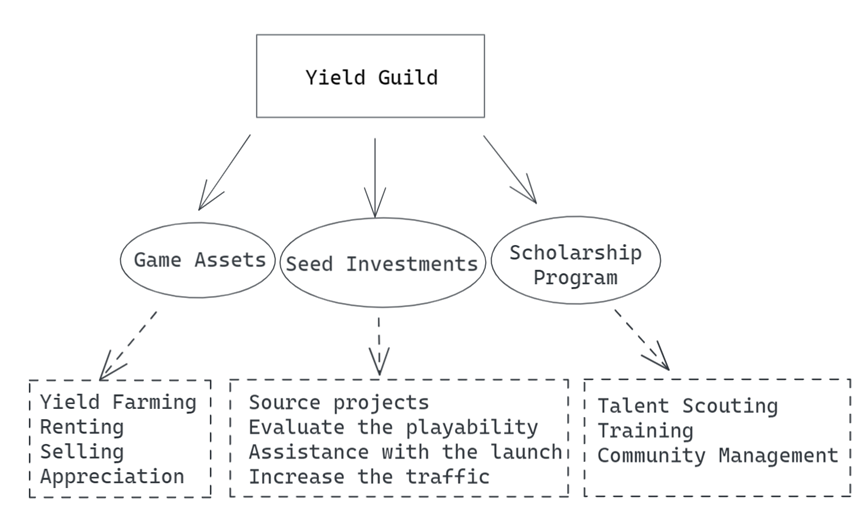
There are three elements in the ecosystem that are directly associated with YGG: seed investment, secondary market (purchasing game NFT assets), and scholarship program (training and operating player community). Instead of regarding YGG as a game guild, think of it as an investment institution that focuses on Cryptocurrency/NFT games and has a very close relationship with both players and developers, assistances with the project not only financially but also in terms of project guidance and community contribution.
So, what will guilds look like in the future?
The evaluate criterial of guilds has been transferred from the accumulation of individual revenue to the balance sheet of a company.
3.1 Distribution channel
While web3 allows everyone to publish their own projects, it also requires endorsements to make them known, and guilds are absolutely one. YGG picks games following three criteria: there are NFT assets in land; the game releases tokens, and the game has Play-to-Earn mechanics such as rewards for PVP and token staking. That is, the games invested by YGG has adaptable ecosystem design for P2E mode and comparably playable with core gameplay. It can be expected that guilds will take place as distribution channels when they promote games on social platform with credible assessing of investment value and playability.
3.2 Esports Tournament Organizer
Guilds will play a role in hosting global esports tournament as sponsors, being responsible for scheme, organizing, broadcasting, connecting social platform, players, arenas etc. The competition of crypto game projects only stays in the regular in-game season at this moment and the commercial potential of esports has not been fulfilled because there is no strong competitive game on stage. Once FPS and MOBAs are in place and sub DAOs’ worldwide spread, guilds will be the best organization for esports teams and initiate global esports tournaments.
3.3 Intercessor to alleviate disputes
Modification on stat point or mechanism during the game operation often result in a different experience for players. As the specific sub DAO of guild is able to communicate with developers officially, the situation in traditional game that players can only comment their discontentment on social media besides the official questionnaire will soon be improved.
Some official restraint aiming at protect the balance of in-game ecosystem affected massive innocent players, thus guild may conduct a poll and negotiate with the game office resolving the conflicts. The guild can also properly restrict players' game behaviors. Players have to abide by certain rules when play with guild assets and won’t risk being banned to harm the game balance with excessive gold production and account abusing.
3.4 Professional game clans
As the refinement of projects according to game genres, players will form different clans based on game preferences and skills, perhaps forming different organization in guild as sub DAOs. For example, YGG is a comprehensive venture capital for comprehensive game investing, guild B focuses on professional video games, and guild C dive into the guidance of traditional player transition.
4.Other crypto gaming guilds
Most crypto game guilds provide guidance and scholarship services for players, partly in the form of DAO organization and a launching platform. However, few guilds are able to completely copy the internal operation of YGG so that most of them extend in a certain direction due to the short development time and insufficient resource capacity.
4.1 Already developed structurally: Merit Circle
The internal structure of Merit Circle is almost consistent with YGG, which is divided into main DAO and sub DAOs, and has two mature cases of game sub DAOs of Axie and Vulcan Forged. The asset ownership and benefit distribution are even more detailed than what YGG published.
Refers to the vaults in sub DAOs, which is how to allocate scholarship, Merit Circle customizes different Vaults for different game mechanics and gives a proven example of Axie Infinity. Moreover, Merit Circle also participate in various gaming projects, acquiring land plots in Big Time (the future operations haven’t been announced) and investing Cyball at a very early stage forming a strategic partnership.
Merit Circle also participate in different games with different methods, acquiring land plots in Big Time (the future operations haven’t been announced) and investing Cyball at a very early stage forming a strategic partnership.

Merit Circle gitbook
4.2 Incubator: GuildFi
GuildFi has similar internal organization of treasury and DAO governance with YGG and they have already invested some games in early stage, turning itself into a game incubator and gaming ventures.
What’s more notable is that they intend to create a stronger bond between players and the game by recruiting sub-guilds and the proof-of-play mechanism. Instead of scouting players top-down, they incorporate those informal local guilds through providing membership and more organized support that effectively expands their influence and player community backup. Besides, the proof-of-play rewards incentivize some individual players or assets owners, who maybe too busy to participate and volunteer in a DAO but collect game items and play occasionally, through entitling them and providing experience point, individual players can level up and get extra bonus even if they are not in any scholarship program. For players with little need to monetize, this lifetime gamer certification involved the sense of accomplishment will keep them motivated to remain and play.
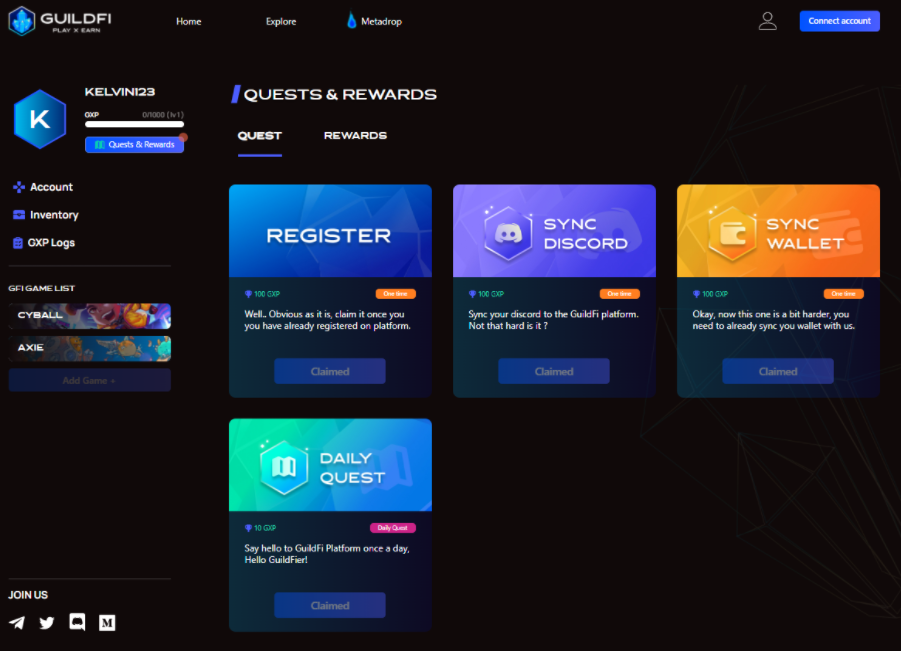
GuildFi whitepaper
4.3 Lending protocol: Metagame Guild
There’s very limited description of the MGG token usage in the whitepaper of rather spending too much space to introduce Axie Infinity and YGG. Even though it’s already weird enough to present achievements from other successful projects and utilize it as own pitch, the lending protocol of Metagame Guild indeed makes an impression.
In addition to purchasing large amount of NFT gaming assets in various projects, MGG DAO encourages contributors to lend their idle assets in the vault to maintain its sustainability and growth, and the contributor or lender will get revenue of deposit. This lending protocol makes MGG more like a lending platform and targeting users who has already own their gaming assets but are too busy or unskilled to maximize the profit of their NFTs.
4.4 Clans: CGU
Some guilds are not into expanding their influence on gaming industry or cooperation with gaming projects, and all they devote to is hiring players around the world. Maybe they lack of criterial for selecting games or just aim to increase their community, focusing on Axie Infinity without acquiring other game assets, the Crypto Gaming United is one of the cases.
Though there are more than twenty sub-communities distributed in different countries and the discord participants reaches 90k, only 5k of them are earning through CGU scholarships. They also design a main DAO and sub DAOs structure in the whitepaper but there’s no signal indicates that they engage in gaming incubator or assets collection besides Axie Infinity, so that the organization of DAO doesn’t effect on the vaults of sub DAOs.

CGU website
4.5 Platform:GameFi
GameFi features a platform rather than a player organization from my personal point of view, and is a sort of Steam version of the guild, which emphasizes the collaboration and exhibition of game projects without intentionally dividing players into different clans.
GameFi is a full-service GameFi hub for game studios, gamers, projects and investors, targeting games on the BSC and Polygon networks, also the first marketplace to allow in-game items and NFTs to be traded across games. The GameFi ecosystem consists of gold unions, game publishing (IGO), game aggregators (a showcase and display portal), asset trading and incubators.

GameFi website
5. How to differentiate guilds as an investor?
5.1 Percipience of games
At this moment, some guilds are constantly expanding their partnerships, but the gameplay of numerous games are disparate if we take a closer look at these projects. From a gameplay point of view, some of these games are not competitive and playable at all, but purely numerical gambling. While these projects are extremely common in the GameFi space, after several crashes, some players have realized that the liquidity of the game token will dry up without core gameplay to retain core players and appeal reinvestment.
Taking Splinterlands as an example, it has far more daily user activity than Axie Infinity, but NFT transactions in the past month have been less than 1/100 of Axie's. If there are limited transactions and disproportionately large amount of login wallet addresses, how to make sure there are real players in the game instead of robots?
There are still some guilds promoting Splinterland regardless of the weird user data.


Games DAU in the past 30days from Dappradar


NFTtransactions of Splinterlans in the past 30days from Dappradar
5.2 Comparative advantage on user base
There is an obvious regional cluster effect of guild participants. For example, YGG SEA acquired the Southeast Asian market during the epidemic when people lost their jobs and have spare time to learn how to make lives through gaming. The large labor force is large, low average salary, widespread mobile devices, and high acceptance of users, these elements interacted and contributed to the success of YGG. With adaptable game resources and user bases, the same accomplishment will emerge in South America, Africa, and parts of East Asia.
On account of the restriction of culture and gaming requirements of translation, there’s localization characteristic that many participants from the local gaming KOLs or friends’ introduction, and the competition on users will soon become a distinctive topic of guilds.
On this basis, YGG has the majority of users in Southeast Asia (mainly in the Philippines), while GuildFi will cannibalize some of the Users in Thailand and both of which have geographical advantages and separate user markets.
Merit Circle may not be as accessible to users as native guilds in developing countries, but it still has first-mover advantage and experience on subDAO operation; the founder of CGU comes from Australia and has users distributed all over the world so that its localization efficiency may be distracted and it also needs the help of many localization teams; while a launchpad like GameFi has possibility to expand its community online by breaking through geographic and cultural barriers.
Additionally, guild should take the responsibility to enrich their game resources as a single game may limit the growth of the diversified player ecosystem. It is abnormal that most of guild members play Axie Infinity and some guilds even have all players playing Axie.
6.Conclusion
YGG was not born by accident. Its co-founder Gabby was a game developer and started his mobile Games company Altitude Games in 2014 then studied how to avoid negative impact of smart contracts and cryptocurrency on the Games industry. Such a founder has deep insights into both the gaming industry and the crypto market, but many of the guilds that are emerging today seldom have relative background.
Game projects related to cryptocurrency attract lots of attention but both game development and community management require a deep understanding of this industry. As a gaming guild, there’s infinite opportunities to hiring players and accompany with emerging games, but what is really matter is that possess forethought and discernment to lead the growth of the blockchain gaming industry.
